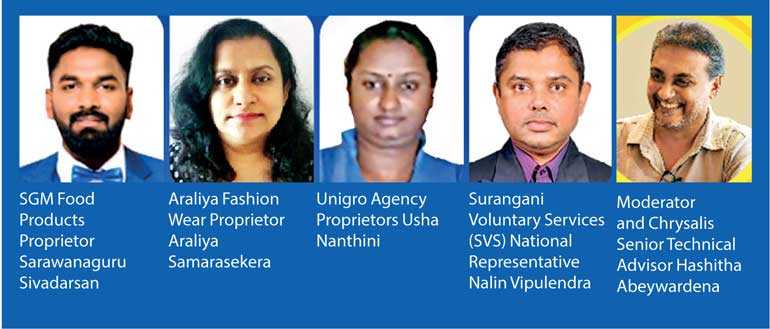Tuesday Mar 03, 2026
Tuesday Mar 03, 2026
Wednesday, 12 August 2020 00:00 - - {{hitsCtrl.values.hits}}

In Sri Lanka the micro, small and medium enterprises (MSMEs) consist of over one million enterprises providing employment to 2.25 million people. With the COVID-19 pandemic continuing to impact the economy, for many acutely vulnerable small businesses; the need to adapt and respond to challenges has fostered resilience during these difficult times.
The European Union Delegation to Sri Lanka and the Maldives in partnership with Chrysalis conducted a webinar on “Growing Resilient Businesses”, showcasing four enterprising men and women from the Central and Uva provinces; sharing their stories on turning challenges into opportunities.
Narrating their individual journeys on the road to recovery were SGM Food Products Proprietor Sarawanaguru Sivadarsan, Araliya Fashion Wear Proprietor Araliya Samarasekera, Unigro Agency Proprietors Usha Nanthini and Senthil Kumar, and Surangani Voluntary Services (SVS) National Representative Nalin Vipulendra.
The event was moderated by Chrysalis Senior Technical Advisor Hashitha Abeywardena. EU Delegation Program Manager and Deputy Head of Cooperation Fabrizio Senesi explaining the objectives of the event said, “Our support to the Sri Lankan economy including the MSMEs is a top priority and this event is to raise awareness of the sector and promote local businesses, which contribute greatly to the country’s economy.”
“The impact of COVID on the economy has been severe, but with it creativity and resilience in the sector and important lessons can be learned. COVID also increased the gaps and barriers for women in business. This webinar will provide opportunities and encouragement particularly to women entrepreneurs.”
A beneficiary of the EU funded Enterprise Development project, Araliya Samarasekera said, “My initial challenge during the lockdown was to pay wages to my staff, mostly women. However, I was able to overcome this and then realized the demand for face masks.”
“I understood the first group, which needed our support were frontline health and military personnel who were in dire need of this item. I first sought approval from the health authorities and we then manufactured and distributed them free of charge. It also presented an opportunity to market the masks commercially, reasonably priced under our unique brand name. The feedback has been very encouraging.”
Advising small businesses she added, “As a female entrepreneur, challenges can arise at any time and we should be ready to face them. As women we have the strength to overcome them.”
Firmly believing in the axiom, “No money, no hope, don’t give up, your business can survive”, Sarawanaguru Sivadarsan elaborated how his spice manufacturing business withstood COVID-19 challenges. He said, “During the crisis we had to face a cash shortage. Buying material during the lockdown we had to purchase 100% by cash and could not approach banks.”
“However, based on my business plan together as a group with my team, we forged ahead. I have a strong customer base and they wait for me to deliver their requirements, which was a great strength to my business. Also due to Covid-19 I was able to develop and move forward in building the business online through a mobile community even receiving orders from new customers.”
Offering advice to the younger generation, he noted, “Opportunities will not be created automatically. We ourselves have to create opportunities even at a time of crisis.”
Owning a successful PVC fittings business, Usha Nanthini described how she overcame the challenges presented by COVID-19. “A business idea and the motivation are the most crucial for a successful business. I had stocked material beforehand in the event of any problem and was able to resume production ensuring worker safety.”
“Though many saw COVID-19 as a problem it gave me time to re-think and plan ahead. Through a WhatsApp group I was able to re-organise my customer base and also use the bus routes to strengthen my delivery distribution network. Due to the lockdown, home gardening and cultivation trend grew which provided a good opportunity to develop fittings for the water supply.”
Encouraging women in business she stated, “Many say that it is difficult for women to participate in untraditional work. I disagree. I aim to manufacture products under my own brand in the future. I believe women can do any business. Chrysalis has supported me throughout.”
“Today I am recognized as Unigro Usha. This has given me confidence to grow and I hope to produce interlock bricks using plastic wastage. If more women are provided with opportunities and enriched, we could break the frame which women are confined to. This is an ideal time for them to contribute to the nation’s economy.”
Describing how his organization, engaged in a social enterprise through a peanut business, worked to overcome COVID-19 challenges, Nalin Vipulendra said, “The needs of children with special needs were to some extent overlooked during this crisis. It was stressful for them as they could not engage in their day-to-day activities, meeting their friends and participating in activities.”
“We made every effort to maintain continuous support and contact with them throughout to provide assistance during this period. We realized that the demand for our products had diminished. We contacted many businesses and provided samples free of charge initially. This resulted in an increased demand for and popularity of our product.”
Elaborating further, he said, “We are supported by Chrysalis and together with other businesses in Monaragala we have established a business forum with 35 entities with an objective of doing social service and also development of businesses, essential business skills such as computer literacy, entrepreneurial knowledge etc.”
“This will open further opportunities for all with the opening of the first business service center in Monaragala to boost future growth.”